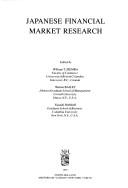| Listing 1 - 10 of 10 |
Sort by
|
Book
Year: 2003 Publisher: Cambridge, Mass. National Bureau of Economic Research
Abstract | Keywords | Export | Availability | Bookmark
 Loading...
Loading...Choose an application
- Reference Manager
- EndNote
- RefWorks (Direct export to RefWorks)
Book
Abstract | Keywords | Export | Availability | Bookmark
 Loading...
Loading...Choose an application
- Reference Manager
- EndNote
- RefWorks (Direct export to RefWorks)

ISBN: 0444888519 Year: 1991 Volume: 205 Publisher: Amsterdam New York Tokyo North-Holland
Abstract | Keywords | Export | Availability | Bookmark
 Loading...
Loading...Choose an application
- Reference Manager
- EndNote
- RefWorks (Direct export to RefWorks)
Money market. Capital market --- Japan --- Financial institutions --- Stock exchanges --- Institutions financières --- Bourse --- -Stock exchanges --- -Bulls and bears --- Commercial corners --- Corners, Commercial --- Equity markets --- Exchanges, Securities --- Exchanges, Stock --- Securities exchanges --- Stock-exchange --- Stock markets --- Capital market --- Efficient market theory --- Speculation --- Financial intermediaries --- Lending institutions --- Associations, institutions, etc. --- -Financial institutions --- Institutions financières --- Bulls and bears --- Financial institutions - Japan. --- Stock-exchange - Japan.
Digital
Year: 1998 Publisher: New York, N.Y. Federal Reserve Bank of New York
Abstract | Keywords | Export | Availability | Bookmark
 Loading...
Loading...Choose an application
- Reference Manager
- EndNote
- RefWorks (Direct export to RefWorks)
Book
Year: 1998 Publisher: New York, N.Y. Federal Reserve Bank of New York
Abstract | Keywords | Export | Availability | Bookmark
 Loading...
Loading...Choose an application
- Reference Manager
- EndNote
- RefWorks (Direct export to RefWorks)
Digital
Year: 2014 Publisher: Cambridge, Mass. National Bureau of Economic Research
Abstract | Keywords | Export | Availability | Bookmark
 Loading...
Loading...Choose an application
- Reference Manager
- EndNote
- RefWorks (Direct export to RefWorks)
We study the impact of nationalism and interstate frictions on international economic relations by analyzing market reaction to adverse shocks to Sino-Japanese relations in 2005 and 2010. Japanese companies with high China exposure suffer relative declines during each event window; a symmetric effect is observed for Chinese companies with high Japanese exposure. The effect on Japanese companies is more pronounced for those operating in industries dominated by Chinese state-owned enterprises, while firms with high Chinese employment experience lower declines. These results emphasize the role of countries' economic and political institutions in mediating the impact of interstate frictions on firm-level outcomes.
Digital
Year: 2003 Publisher: Cambridge, Mass. NBER
Abstract | Keywords | Export | Availability | Bookmark
 Loading...
Loading...Choose an application
- Reference Manager
- EndNote
- RefWorks (Direct export to RefWorks)
Book
Year: 1989 Publisher: Cambridge, Mass. National Bureau of Economic Research
Abstract | Keywords | Export | Availability | Bookmark
 Loading...
Loading...Choose an application
- Reference Manager
- EndNote
- RefWorks (Direct export to RefWorks)
This paper studies the predictability of monthly excess returns on equity portfolios over the domestic short-term interest rate in the U.S. and Japan during the period 1971:1-1989:3. The paper finds that similar variables, including the dividend-price ratio and interest rate variables, help to forecast excess returns in each country. In addition, in the 1980's U.S. variables help to forecast excess Japanese stock returns. There is evidence of common movement in expected excess returns across the two countries, which is suggestive of integration of long-term capital markets.
Book
Year: 2003 Publisher: Cambridge, Mass. National Bureau of Economic Research
Abstract | Keywords | Export | Availability | Bookmark
 Loading...
Loading...Choose an application
- Reference Manager
- EndNote
- RefWorks (Direct export to RefWorks)
The dramatic rise and fall of the Japanese equity market provides a unique opportunity to examine market-and firm-specific risks over different market conditions. The price behavior of Japanese equities in the 1990s is found to resemble that of U.S. equities during the Great Depression. Both show increasing market volatility and a prolonged large co-movement in equity prices. What is unique about the Japanese case is the surprising fall in firm-level volatility and turnover in Japanese stocks after its market crash in 1990. This large decrease in firm-level volatility may have impeded Japan's capital formation process as it has become more difficult over the past decade for both investors and managers to separate high quality from low quality firms. Using data on firm performance fundamentals and corporate bankruptcies, we show that the fall in firm-level volatility and turnover in Japanese stocks could be attributed to the sharp increase in earnings homogeneity among Japanese firms and the lack of corporate restructuring.
Book
Year: 2014 Publisher: Cambridge, Mass. National Bureau of Economic Research
Abstract | Keywords | Export | Availability | Bookmark
 Loading...
Loading...Choose an application
- Reference Manager
- EndNote
- RefWorks (Direct export to RefWorks)
We study the impact of nationalism and interstate frictions on international economic relations by analyzing market reaction to adverse shocks to Sino-Japanese relations in 2005 and 2010. Japanese companies with high China exposure suffer relative declines during each event window; a symmetric effect is observed for Chinese companies with high Japanese exposure. The effect on Japanese companies is more pronounced for those operating in industries dominated by Chinese state-owned enterprises, while firms with high Chinese employment experience lower declines. These results emphasize the role of countries' economic and political institutions in mediating the impact of interstate frictions on firm-level outcomes.
| Listing 1 - 10 of 10 |
Sort by
|

 Search
Search Feedback
Feedback About UniCat
About UniCat  Help
Help News
News